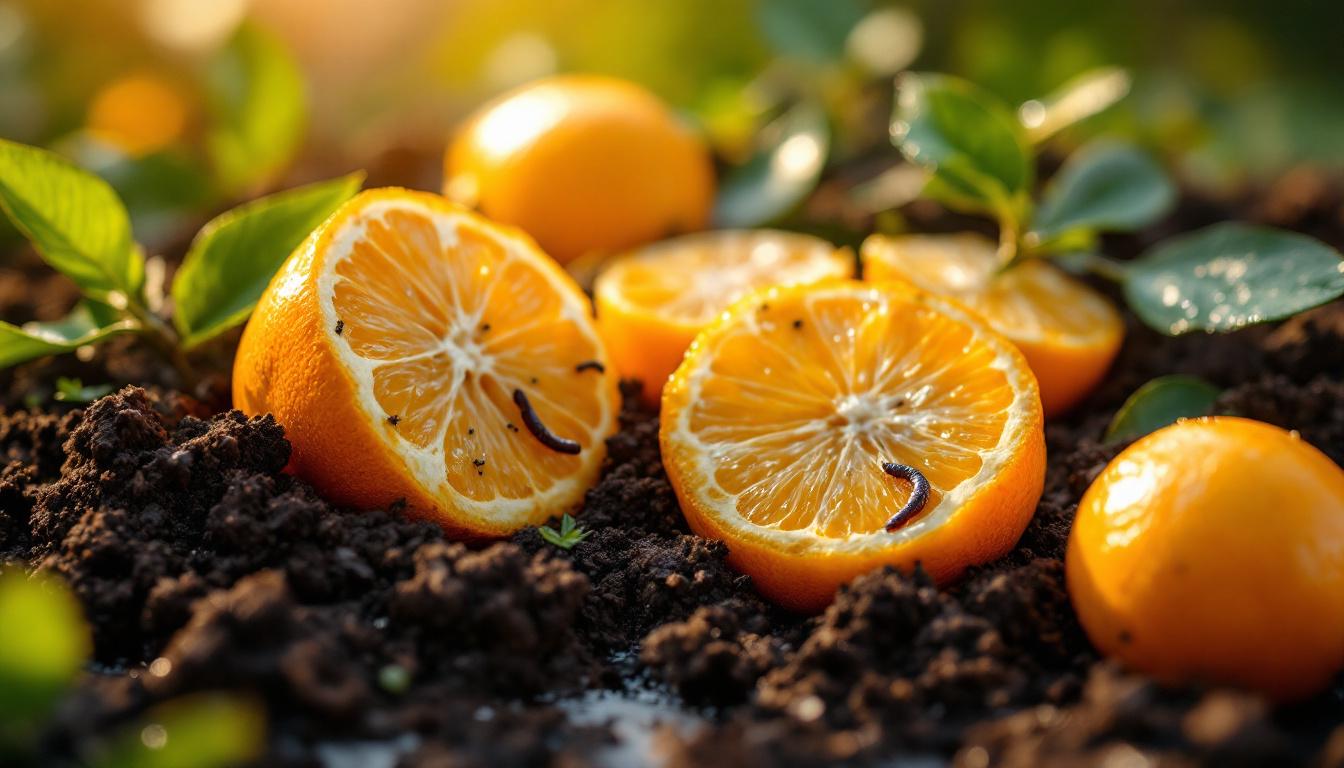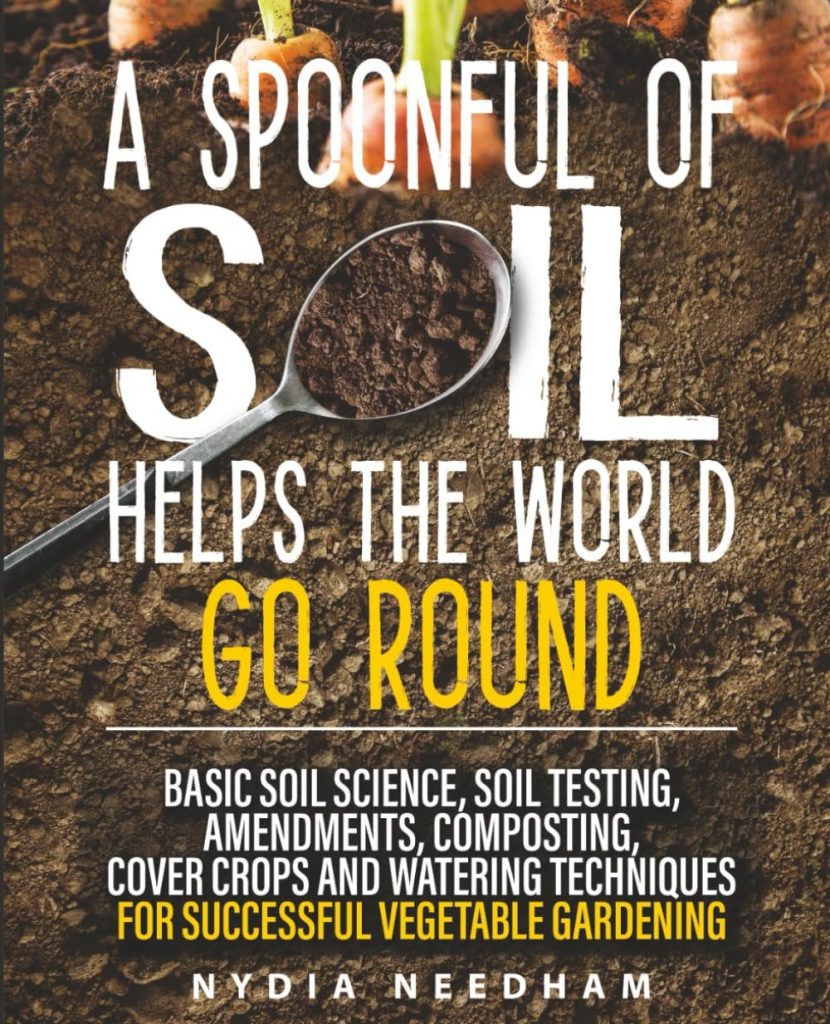Composting Citrus Fruits can be easy and rewarding.
Discover simple tips to break down citrus peels and boost your garden’s health naturally and safely.
Reducing food waste is a crucial step towards a more sustainable lifestyle. One effective way to achieve this is by composting organic waste, including citrus fruits like oranges and lemons.
Composting these items not only reduces the amount of waste sent to landfills but also creates a nutrient-rich soil amendment for gardens.
Many people are hesitant to compost citrus fruits due to concerns about their acidity and potential impact on the compost pile.
However, when done correctly, composting oranges and lemons can be a valuable addition to your composting routine.
Key Takeaways
- Citrus fruits can be composted to reduce food waste.
- Oranges and lemons add valuable nutrients to compost.
- Proper composting techniques can mitigate acidity concerns.
- Composting citrus fruits supports a sustainable gardening practice.
- Reducing landfill waste through composting is environmentally beneficial.
The Citrus Composting Debate
Gardeners have long been divided on whether citrus fruits should be included in compost piles. This debate stems from various misconceptions and concerns about the impact of citrus on the composting process.
Common Misconceptions About Composting Citrus
One common misconception is that citrus fruits are too acidic for compost.
While it’s true that citrus peels contain citric acid, the acidity is not typically strong enough to significantly affect the overall pH of the compost pile.
Another misconception is that citrus peels will repel beneficial microorganisms.
However, research suggests that citrus peels can actually be broken down by microorganisms, contributing to a diverse compost ecosystem.
Why Some Gardeners Avoid Citrus in Compost
Some gardeners avoid adding citrus to their compost due to concerns about D-limonene, a natural compound found in citrus peels that can inhibit microbial growth.
However, when properly balanced within the compost mix, the negative effects of D-limonene can be mitigated.
The Truth About Citrus in Compost Piles
The truth is, citrus fruits can be a valuable addition to compost piles when managed correctly. They provide essential nutrients and can help improve soil structure.
| Benefits of Composting Citrus | Potential Drawbacks |
|---|---|
| Nutrient-rich compost | Potential acidity |
| Improved soil structure | D-limonene inhibition |
| Diverse microbial ecosystem | Slow decomposition |
By understanding the benefits and potential drawbacks, gardeners can make informed decisions about composting citrus fruits like oranges and lemons.
With proper management, citrus can be a valuable component of a citrus fruit composting guide.
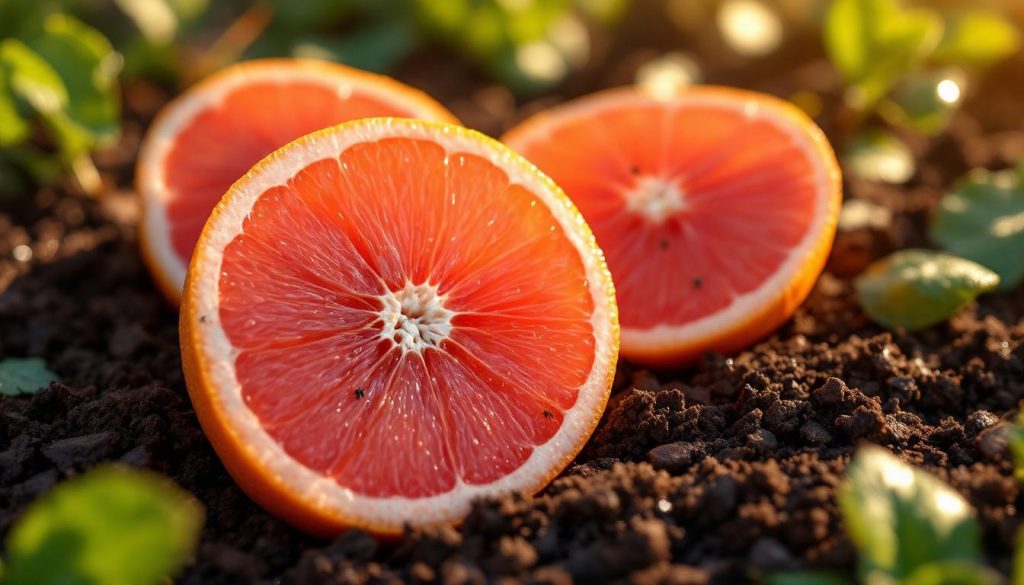
Can You Compost Citrus Fruits Like Oranges and Lemons?
As we strive to reduce food waste, understanding how to compost citrus fruits becomes increasingly important.
Many gardeners and environmentally conscious individuals are curious about whether they can compost citrus fruits like oranges and lemons.
The Short Answer: Yes, But With Considerations
The straightforward answer is yes, you can compost citrus fruits. However, it’s not without its considerations.
Citrus peels are high in acidity and contain oils that can affect the decomposition process and potentially harm microorganisms in the compost.
Understanding Citrus Decomposition
Citrus decomposition is a complex process influenced by the fruit’s high acidity and oil content. The peels of oranges, lemons, and other citrus fruits contain D-limonene, a natural compound that can inhibit microbial growth.
As a result, citrus peels decompose at a slower rate compared to other organic materials.
Differences Between Oranges, Lemons, and Other Citrus
Not all citrus fruits are created equal when it comes to composting. Oranges, lemons, limes, and grapefruits have different peel thicknesses and oil concentrations, affecting their decomposition rates.
For instance, orange peels are generally thicker and may take longer to break down than lemon peels.
| Citrus Fruit | Peel Thickness | Decomposition Rate |
|---|---|---|
| Orange | Thick | Slow |
| Lemon | Thin | Moderate |
| Lime | Thin | Moderate |
| Grapefruit | Thick | Slow |
By understanding these differences, gardeners can better manage their compost piles and make informed decisions about adding citrus fruits.
The Science Behind Citrus Composting
The science behind composting citrus fruits involves understanding their chemical composition and how it affects the decomposition process.
Citrus peels, for instance, contain oils and acids that can impact microbial activity in compost piles.
Acidity Levels in Citrus Peels
Citrus peels are known for their acidity, primarily due to their citric and ascorbic acid content. This acidity can potentially lower the pH of compost piles, affecting microbial activity.
However, in moderation, citrus peels can be managed within a balanced compost mix.
D-Limonene: The Natural Insecticide in Citrus
D-Limonene, a compound found in citrus peels, acts as a natural insecticide.
While it can help deter pests, it can also slow down the decomposition process if present in high concentrations. To mitigate this, it’s essential to balance citrus peels with other compost materials.
Breakdown Time for Citrus Materials
The breakdown time for citrus materials can vary depending on factors like the size of the peels, the carbon-to-nitrogen ratio in the compost pile, and microbial activity.
Generally, citrus peels take longer to decompose than other fruit wastes.
How Microorganisms Process Citrus Oils
Microorganisms play a crucial role in breaking down citrus oils. Certain bacteria and fungi are capable of degrading D-Limonene and other citrus compounds, facilitating the decomposition process.
Ensuring a diverse microbial community in your compost can help efficiently process citrus materials.
By understanding these scientific aspects, gardeners can better manage their compost piles to effectively compost citrus fruits at home, utilizing effective citrus fruit composting methods.
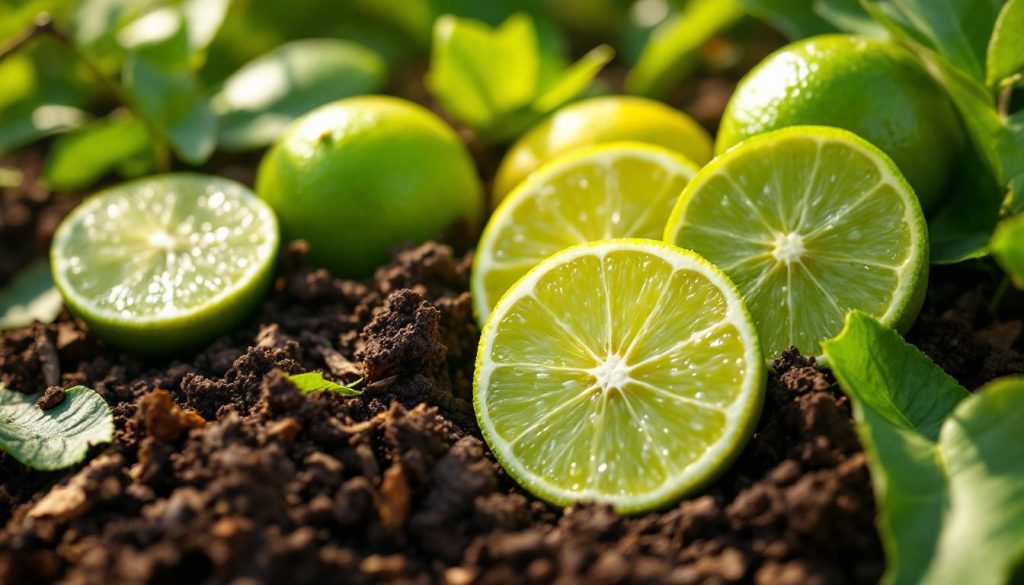
Benefits of Adding Citrus to Your Compost
Adding citrus peels to your compost pile not only reduces waste but also brings numerous benefits to your garden.
Citrus fruits, when composted correctly, can enhance the nutrient content of your compost, improve its overall quality, and even help in managing pests.
Nutrient Content in Citrus Peels
Citrus peels are rich in nutrients such as nitrogen, phosphorus, and potassium, which are essential for healthy plant growth.
Nitrogen promotes leaf growth, phosphorus supports root development, and potassium helps with overall plant health.
Improving Compost Quality
The addition of citrus peels can improve the structure and fertility of the compost.
Citrus peels are also high in organic matter, which helps in improving the water-holding capacity of the compost, making it more effective for plant growth.
Reducing Food Waste
Composting citrus fruits is an effective way to reduce food waste. By composting citrus peels, you are diverting waste from landfills and creating a valuable resource for your garden.
This practice supports sustainable gardening and reduces the environmental impact of waste disposal.
Pest Management Benefits
Citrus peels contain D-limonene, a natural compound that can help deter pests.
When added to compost, citrus peels can help manage pests in the garden, reducing the need for chemical pesticides.
The benefits of composting citrus fruits can be summarized as follows:
- Rich in essential nutrients like nitrogen, phosphorus, and potassium.
- Improves the quality and structure of compost.
- Reduces food waste and supports sustainable gardening practices.
- Helps in managing pests naturally due to the presence of D-limonene.
When Not to Compost Citrus Fruits
There are instances where composting citrus fruits like orange and lemon peels may not be advisable.
While citrus can be a valuable addition to many compost piles, certain conditions may require alternative approaches.
Vermicomposting Considerations
Vermicomposting, or worm composting, is a sensitive process. Citrus fruits can be too acidic for worms, potentially harming them.
If you’re using vermicomposting, it’s best to avoid adding citrus peels to prevent creating an unfavorable environment for your worms.
Small-Scale Composting Limitations
For small-scale composting, such as in indoor bins or small outdoor piles, citrus fruits can attract pests and create odors.
This can be particularly problematic in small or enclosed spaces.
Comparison of Composting Methods and Citrus Suitability
| Composting Method | Citrus Suitability | Reason |
|---|---|---|
| Vermicomposting | No | Too acidic for worms |
| Small-Scale Composting | Limited | Attracts pests, creates odors |
| Large-Scale Composting | Yes | Can be balanced with other materials |
Organic Certification Concerns
For those seeking organic certification, it’s essential to check the specific guidelines regarding citrus composting.
Some certification programs may have restrictions on using citrus peels due to their potential acidity and oil content.
Situations Where Citrus May Inhibit Decomposition
In certain conditions, such as in compost piles with poor aeration or those that are too dry, adding citrus can further inhibit decomposition.
It’s crucial to ensure that your compost pile is well-balanced and maintained before adding citrus fruits.
Best Practices for Composting Citrus Fruits
To make the most of your citrus waste, it’s essential to follow best practices for composting.
Composting citrus fruits like oranges and lemons can be a bit challenging due to their acidity and oil content, but with the right techniques, you can create a nutrient-rich compost that benefits your garden.
Preparing Citrus Peels for Composting
Before adding citrus peels to your compost, proper preparation is key. This involves a couple of crucial steps to ensure that they break down efficiently.
Cutting and Shredding Techniques
Cutting or shredding citrus peels into smaller pieces increases their surface area, allowing microorganisms to break them down more quickly.
Shredding is particularly effective as it helps to release the oils and acids contained within the peels, facilitating a faster decomposition process.
Removing Stickers and Non-Compostable Elements
It’s also important to remove any stickers or non-compostable elements from the citrus peels. Stickers can be made from plastic or other materials that do not decompose and can contaminate your compost.
Take a moment to inspect the peels and remove any such elements to ensure your compost remains safe and effective.
Balancing Your Compost Mix
A well-balanced compost mix is crucial for effective decomposition.
This involves managing the carbon-to-nitrogen ratio and mixing citrus peels with other compost materials.
Carbon to Nitrogen Ratio
Citrus peels are considered “green” material, high in nitrogen. To balance this, you need to add “brown” materials, which are high in carbon.
A general rule of thumb is to maintain a mix of 2/3 brown materials and 1/3 green materials. Brown materials include dried leaves, straw, or shredded newspaper.
Mixing Citrus With Other Materials
Mixing citrus peels with a variety of other compost materials not only balances the carbon-to-nitrogen ratio but also adds diversity to the microorganisms in your compost.
This diversity is key to creating a healthy, nutrient-rich compost. Consider adding other kitchen scraps, grass clippings, or garden waste to your compost pile.
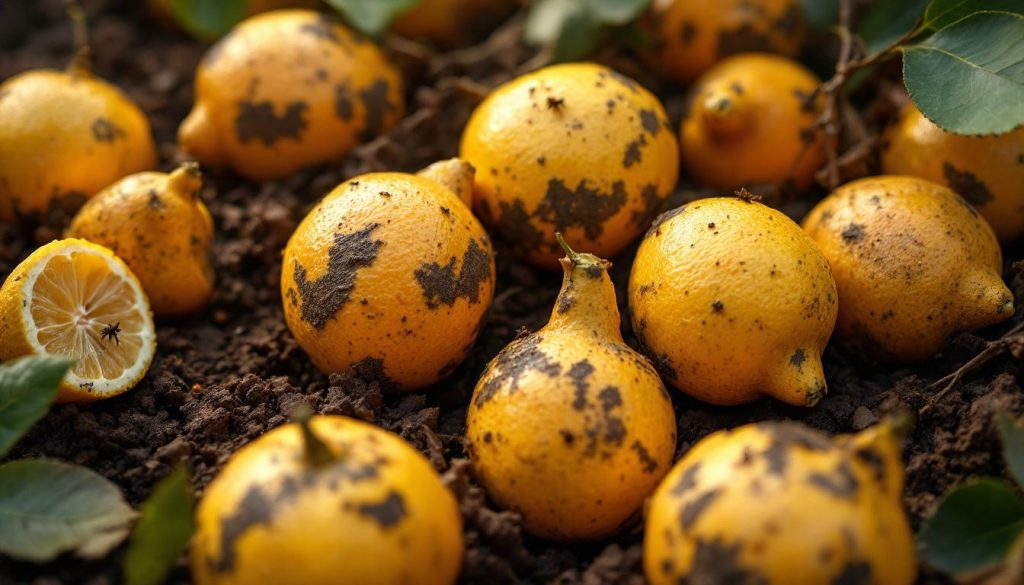
Composting Methods for Citrus
There are several methods you can use to compost citrus fruits, each with its own advantages.
Traditional Compost Piles
Traditional compost piles are a straightforward way to compost citrus peels.
Ensure your pile is well-aerated and regularly turned to maintain oxygen flow and speed up decomposition.
Compost Tumblers
Compost tumblers are an efficient option for composting citrus.
They allow for easy turning of the compost, which is crucial for maintaining aerobic conditions and speeding up the decomposition process.
Bokashi Composting
Bokashi composting is a fermentation-based process that can effectively break down citrus peels. This method involves layering kitchen scraps, including citrus, with Bokashi bran in a sealed container.
Bokashi composting is particularly useful for managing small amounts of citrus waste indoors.
| Composting Method | Advantages | Disadvantages |
|---|---|---|
| Traditional Compost Piles | Easy to set up, can handle large quantities | May require more maintenance, potential for odors |
| Compost Tumblers | Easy to turn, maintains aerobic conditions | Initial investment, limited capacity |
| Bokashi Composting | Ideal for indoor use, minimal odors | Requires Bokashi bran, fermentation process |
Alternative Methods for Recycling Citrus Waste
Beyond composting, citrus waste can be repurposed in various innovative ways, adding value to your garden and home.
While composting is a popular method for recycling citrus fruits, there are other creative and practical uses for orange and lemon peels that can benefit from the benefits of composting citrus fruits.
Citrus Peel Vinegar and Cleaners
One of the most useful alternatives to composting citrus peels is making citrus peel vinegar. This natural cleaner is effective, eco-friendly, and simple to prepare.
By infusing citrus peels in vinegar, you create a multipurpose cleaning solution that can be used throughout your home.
This method not only reduces waste but also provides a chemical-free cleaning option.
Dried Peels for Home Uses
Drying citrus peels is another way to repurpose them. Dried peels can be used in potpourri, as a natural air freshener, or even as a component in homemade crafts. T
hey can also be used to make tea or add flavor to baked goods.
This method is a great way to utilize citrus waste while avoiding the potential drawbacks of composting orange and lemon peels in large quantities.
Citrus Oil Extraction
Citrus oil extraction is a more advanced method of utilizing citrus waste.
The peels of citrus fruits like oranges and lemons contain oils that can be extracted and used in various applications, from aromatherapy to natural pest control.
While this method requires some equipment and knowledge, it offers a unique way to capitalize on the value of citrus waste.
Garden Applications Beyond Composting
Citrus peels can also be used directly in the garden in ways that go beyond composting. For example, they can be used to deter pests or as a natural mulch.
Some gardeners even use citrus peels to improve soil structure or as a component in seed-starting mixes.
These applications highlight the versatility of citrus waste and its potential to contribute to a more sustainable gardening practice, aligning with a comprehensive citrus fruit composting guide that explores various uses.
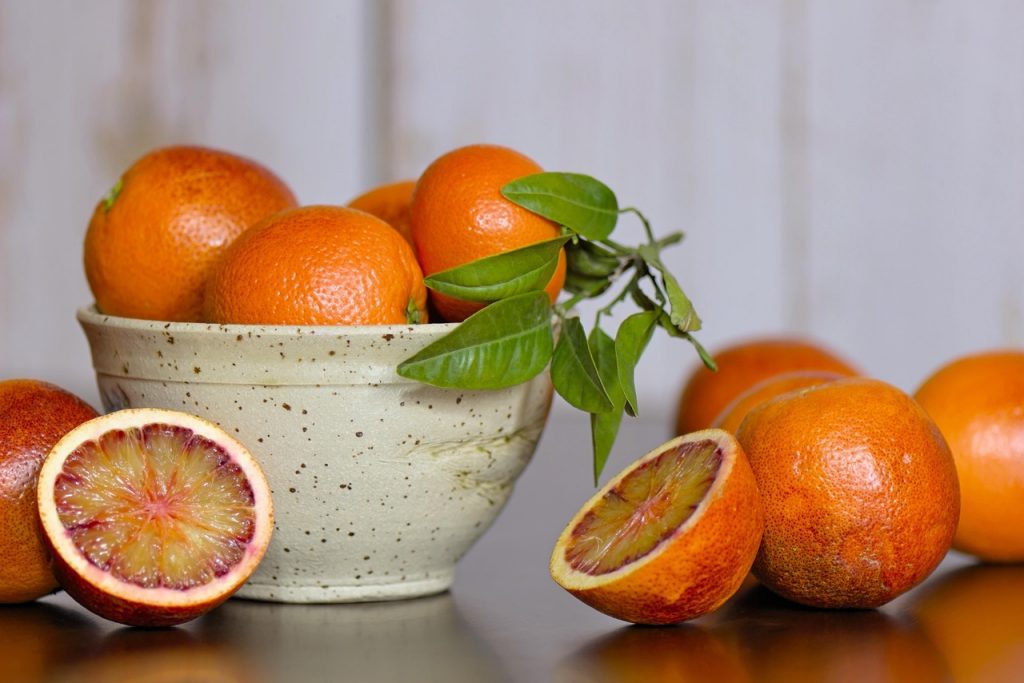
Troubleshooting Common Citrus Composting Problems
As with any composting process, there are potential issues to watch out for when composting citrus fruits.
While citrus can be a valuable addition to compost, it can also cause problems if not managed correctly. In this section, we’ll explore some common issues that arise when composting citrus fruits and provide practical solutions to overcome them.
Dealing With Mold on Citrus Peels
Mold on citrus peels can be a sign of too much moisture or inadequate aeration in the compost pile.
To address this issue, ensure that your compost pile is well-aerated and that the citrus peels are balanced with dry materials.
Addressing Slow Decomposition
Citrus peels can be slow to decompose due to their high concentration of oils and acids.
To speed up the process, chop the peels into smaller pieces and mix them with other compost materials that are high in nitrogen.
Managing Pests Attracted to Citrus
Citrus fruits can attract pests like fruit flies and rodents. To manage these pests, bury the citrus peels deep within the compost pile and cover them with a layer of brown materials.
Balancing pH in Citrus-Heavy Compost
Citrus fruits are acidic, and adding too many of them to your compost can throw off the pH balance.
To balance the pH, mix in materials that are high in calcium, such as crushed eggshells or limestone.
| Issue | Solution |
|---|---|
| Mold on citrus peels | Ensure adequate aeration and balance with dry materials |
| Slow decomposition | Chop peels into smaller pieces and mix with nitrogen-rich materials |
| Pests attracted to citrus | Bury peels deep and cover with brown materials |
| pH imbalance | Mix in calcium-rich materials like crushed eggshells or limestone |
Conclusion: Making the Most of Your Citrus Waste
Composting citrus fruits like oranges and lemons can be a valuable addition to your garden, providing essential nutrients and improving soil quality.
By understanding the benefits and best practices for composting citrus fruits, you can reduce food waste and create a more sustainable gardening routine.
To successfully compost citrus, it’s essential to balance your compost mix, prepare citrus peels properly, and be aware of potential issues like acidity and pests.
By following these guidelines, you can harness the power of citrus composting to enhance your garden’s health and productivity.
Reducing food waste through composting citrus fruits is a simple yet effective way to make a positive impact on the environment.
As you incorporate citrus into your composting routine, you’ll not only be reducing waste but also creating a nutrient-rich soil amendment that will benefit your garden for years to come.

